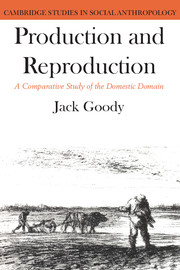Book contents
- Frontmatter
- Contents
- Tables
- Figures
- Preface
- Acknowledgements
- 1 The evolution of the domestic economy: the hoe and the plough
- 2 The theory, the variables and a test
- 3 Making causal inferences
- 4 Farming, labour and sex
- 5 Concubines and co-wives: the structure of roles in Africa and Eurasia
- 6 Adoption in cross-cultural perspective
- 7 Strategies of heirship
- 8 Class and marriage
- 9 Retrospect
- Appendix 1 Tables
- Appendix 2 The probability of family distributions
- Notes
- References
- Index
3 - Making causal inferences
Published online by Cambridge University Press: 05 June 2012
- Frontmatter
- Contents
- Tables
- Figures
- Preface
- Acknowledgements
- 1 The evolution of the domestic economy: the hoe and the plough
- 2 The theory, the variables and a test
- 3 Making causal inferences
- 4 Farming, labour and sex
- 5 Concubines and co-wives: the structure of roles in Africa and Eurasia
- 6 Adoption in cross-cultural perspective
- 7 Strategies of heirship
- 8 Class and marriage
- 9 Retrospect
- Appendix 1 Tables
- Appendix 2 The probability of family distributions
- Notes
- References
- Index
Summary
Having looked at the relationship between kinship and property (a central theme in McLennan's writing), we come back to Vinogradoff's concern with agriculture and the economy. Diverging devolution is the transmission of property to children of both sexes. It arises, I suggest, when parents are concerned to maintain the status of their children vis-à-vis other members of the community, and particularly the status of their daughters, by means of the settlement of property. Hence it is likely to appear in societies in which status is based on economic differentiation. Indeed it is both a cause and effect of a certain type of stratification. When differences of economic status emerge, when one wants to control the marriages of daughters or sisters in terms of that status, then dowry is the characteristic marriage transaction.
There are many ways in which this degree of economic stratification may arise, but in the present context the critical one is by means of an increase in productivity that permits and encourages greater differentiation than is possible under, say, the conditions of hoe farming. The work of Gordon Childe on the prehistory of the Middle East, as well as that of McNeill in the wider context of world history, suggests that the most important way of increasing production is by mechanising agricultural production, as when animal traction is used to plough the land.
- Type
- Chapter
- Information
- Production and ReproductionA Comparative Study of the Domestic Domain, pp. 23 - 30Publisher: Cambridge University PressPrint publication year: 1977

